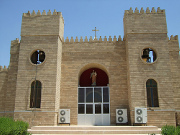
Iraq (MNN) — It appears that a segment of Iraq is considering a
blasphemy law.
At one time, the region of Northwestern Iraq was a haven for
Christians in the troubled Middle East. Reports two years ago showed that as Christians fled Baghdad, they sometimes
headed for Kurdistan.
Today, that could be changing. It seems that as the exodus continued out of Iraq,
conditions have also steadily deteriorated in Kurdistan due to Islamic
extremism.
Kurdistan is autonomous in Iraq and has its own regional
government. Parliamentarians in Iraq's
Kurdish region hope to end religious violence by banning insults to what
"all religions" have in common. Paul Estabrooks, minister-at-large for
Open Doors explains, "They have not
mentioned any specific religion in the law, but the common aspects are 'God,' The
Prophet, and 'Holy Book.' They're trying to develop something that will cut
off these kinds of challenges that occur repeatedly."
The draft bill calls for up to 10 years in prison and closing a
publication for vaguely worded offenses such as "portraying the prophets
inappropriately." It is expected to
be voted on in the near future.
The
legislation came about after the publication of an article in May 2010 that was
an imaginary discussion with God that included profanity. Outrage over the article
boiled into rioting that caused property damage and led to arrests and
injuries.
Because it was an apparent response to a free speech issue, there
were concerns that the bill would also limit free speech. Estabrooks says, "Basher
Hadad, the head of the committee that's drafting this bill in Iraq, has told
different news services that this is not going to be any kind of censorship,"
but he believes that's a total front.
By the vague nature of the bill's wording, it will do exactly that,
even though people are assured that they will still be free to criticize
mullahs, scholars, Islam, or the history of Islam. Estabrooks says, "The real issue, of course, is
that fine line between 'criticism' and 'insult.'
Any kind of criticism is also perceived as 'insult.'"
Government officials say the law will protect Christians and Muslims. However, Estabrooks is doubtful. "There's no track record yet of any of
these blasphemy laws benefiting Christians. Usually, it's just the opposite."
The atmosphere has decidedly cooled toward believers in the
region. Right now, says Estabrooks, "Christians
have had some opportunity to function as Christians without restrictions, at least from the government." Change is
coming, he says. "Whether the government can protect them from what will
become challenges of blasphemy remains to be seen."
Estabrooks thinks it won't be long before the impact on Gospel work will
also be evident. "Christians are going to be a little more hesitant
to be outspoken, or to be able to share anything because of the concern of it
being interpreted as an insult and therefore, blasphemy."
It's not time to panic. You can pray that the bill would not pass. "Pray that God will enable the Christians
to be the good citizens of this country and to be able maintain the freedom they have at this point to share the Gospel."

